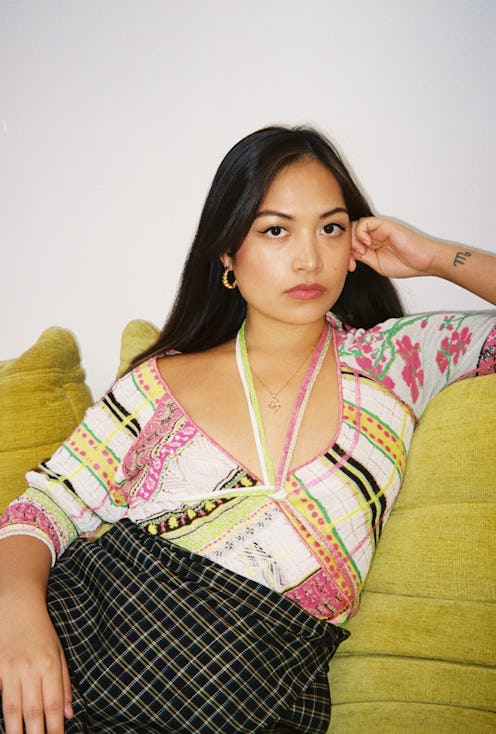Books
In Happy Hour, The Party Girls Are All Right
Marlowe Granados’ debut novel follows young women who traverse New York’s party scene and emerge unharmed.

There’s a 2006 New York Post cover that has become synonymous with early aughts celebrity culture. On it, Paris Hilton, Britney Spears, and Lindsay Lohan all ride shotgun after a night out; the headline “Bimbo Summit” is emblazoned across them. That year, there was no more platonic ideal of a party girl than this holy trinity. The paparazzi and tabloids chronicled their every move, simultaneously deifying and crucifying them with each news item. At the time, they were still at the height of their power: Spears was on the cusp of putting out her fifth studio album, Lohan was starring in prestige films like Prairie Home Companion, Hilton was on The Simple Life. It would take the media a few more years (and many more nasty headlines) to fully chew them up and spit them out.
From what became of the members of that “Bimbo Summit” to the fates of Peaches Geldof and Princess Diana, the party girl’s punishment is often severe. Dare to live an indulgent life, and you must pay. It’s a trope that author Marlowe Granados, whose debut novel Happy Hour centers on a plucky wild child, is hellbent on rejecting. “That's a very classic [example of this] party girl narrative, right?” Granados says of Princess Diana’s fate. “She had this authoritative situation that she tried to move out of because it was really holding her back. Then once she got free, she was punished.”
Granados, 29, had a “party girl phase” of her own. Growing up in suburban Toronto with a single mom and little money, by her teen years she was using her ingenuity to pursue the high life. Soon, she was being flown to European locales like Zurich to attend the birthday parties of powerful men. She appeared in music videos and commercials, dabbled in modeling, and relied on her charm in order to make ends meet. While it wasn’t always the most stable lifestyle, nothing that bad ever happened to Granados. Much like other real-life party girls whose stories don’t pepper the Post’s Page Six, she simply got by.
“I wanted [Happy Hour] to be like, ‘This could be a way that someone's just living right now,’” Granados says when we meet at the much-Instagrammed PUBLIC Hotel. Poised in a pair of Fendi sandals and sipping a glass of water (even party girls sometimes have to be on their best behavior) she looks every bit the embodiment of the lifestyle we’re discussing. “[These are normal party girls] who are in our midst, all the time… [unlike] this poor little rich girl thing.”
Happy Hour follows Isa, a 21-year-old mixed-race recent New York transplant who has come to the city in the pursuit of fun. She spends the summer with her childhood best friend, Gala, attending loft parties and mingling with artists and aristocrats. It’s not all French 75s and soirées — the two share a small Bed-Stuy bedroom, sell used clothes at a weekend market, and survive on a steady diet of hot dogs — but their financial struggle is simply another outlet to showcase Isa’s scrappiness. The novel’s tension is instead rooted in Isa’s experience of romantic rejection and the pain points of female friendship.
When Granados first began shopping Happy Hour to publishing houses in 2017, they weren’t sold on her punishment-free vision for the book. “An editor wrote back being like, ‘I honestly had the feeling that they would be fine, so my investment dropped off.’ Which is insane. It was interesting to have that kind of feedback, because I was like, ‘Everything you’re saying is the reason why I wrote it,’” says Granados. “What they think is a flaw, I think is an important thing to have in the contemporary literary world at the moment. Especially since we’re so used to this idea of wanting this very clear-cut movement and growth in fiction.”
Now arriving on American shelves four years later, Granados’ choice to not “tax these women with trauma,” as her editor put it in an interview with New York magazine, is what’s being celebrated. While this decision has led outlets and readers alike to herald it as a fresh take on the party girl genre, Granados believes it actually harkens back to a more traditional model of this type.
“Women in film all the way back to the ‘30s — Barbara Stanwyck, Kay Francis, these kinds of comedians,” she says of her inspirations for Happy Hour’s protagonist. “I've read a lot of memoirs, too. There’s this really great one called American Cocktail by Anita Reynolds, this woman who was mixed race in the ‘20s. She kind of passed [as white] so she was moving around through different worlds, which I think requires a little bit of naughtiness.”
Granados, too, revels in naughtiness, and brought plenty of it to her publicity tour. She drank her way through Manhattan while being interviewed for various outlets, spent her nights at parties frequented by both Charli D'Amelio and Isabelle Huppert, and got recognized at New York City hot spots like Pastis. But despite running around the city in a way that would do her characters proud, Granados has one last bucket list item — getting a DM from a B-list celebrity. As we exit the PUBLIC’s upstairs lounge, I ask her: Has she been able to will the DM into existence?
“Not in the correct way. Not in a way that I'd be interested in,” she responds coyly, letting the many possibilities of who could have crafted the message linger in the air. Then she’s onto the next topic, and soon after, the next obligation — a true party girl never stays in one place for long.
This article was originally published on